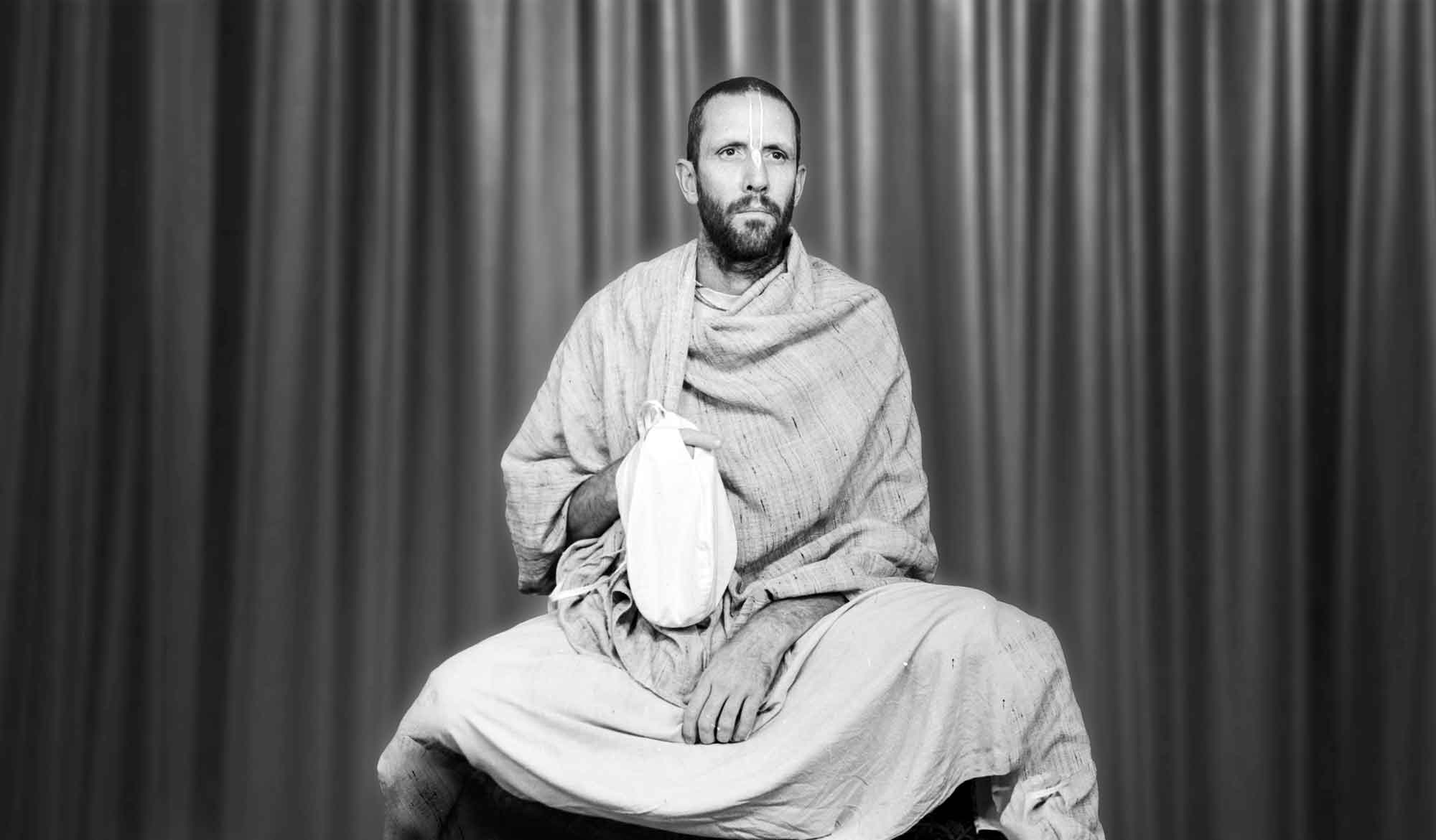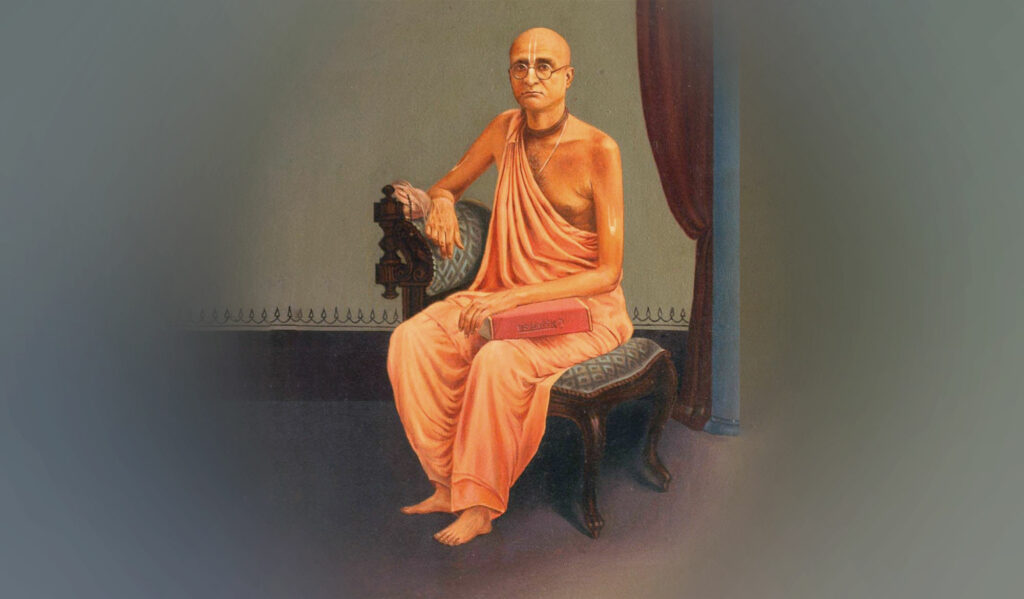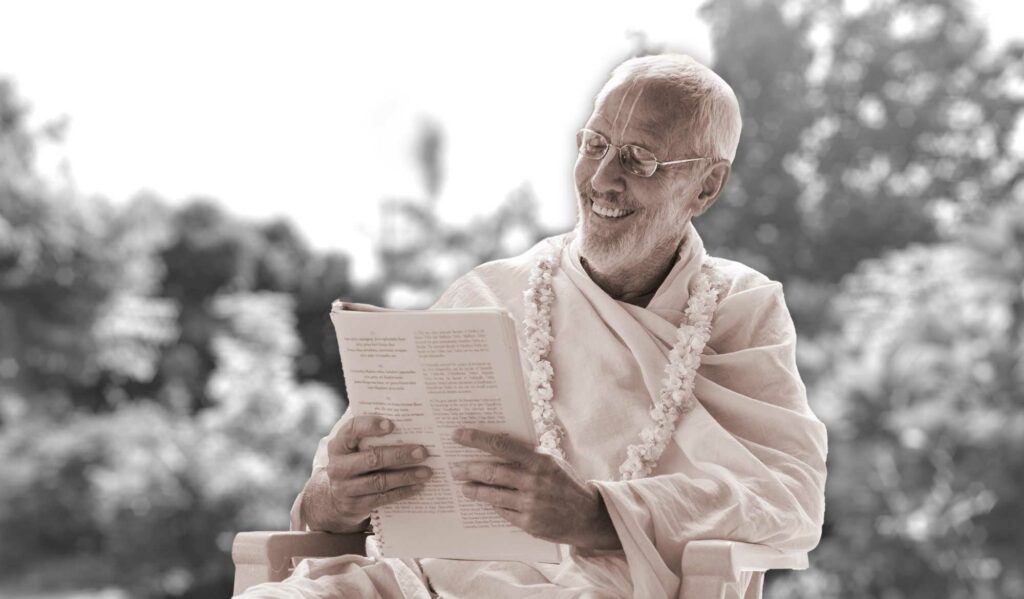Overview
The following excerpt is from an upcoming publication of questions and answers with Śrīla B.G. Narasiṅgha Mahārāja. In this selection, Śrīla Narasiṅgha Mahārāja answers various questions concerning the chanting of the Holy Name.
- Question: How can we have an ecstatic kīrtana?
- Question: Do you have to be initiated to lead kīrtana?
- Question: What is more important, service or chanting?
- Question: It has been said that when one attains the spiritual world, the Holy Name goes to the background, and the līlā of Kṛṣṇa comes to the foreground. But here in this world it’s just the opposite. In this world, the Holy Name of Kṛṣṇa is in the foreground, and the līlā of Kṛṣṇa is in the background. So why is this?
- Question: Some devotees have some musical background before coming to Kṛṣṇa consciousness. What is your advice to them when they do kīrtana?
- Question: Why is it we sometimes hear the mahā-mantra sung in two parts.
Question: How can we have an ecstatic kīrtana?
Answer: When someone says, “Let’s have an ecstatic kīrtana!” what they should actually be saying is, “Let us try to have an ecstatic kīrtana.” You can’t just have an ecstatic kīrtana. Ecstatic kīrtana may just be youthful exuberance, and I may also add that a ‘really sweet mellow kīrtana’ might just be your old age – it might not be the mellows of the Holy Name at all.
It is said that when Śrīla Gaura Kiśora Dāsa Bābājī chanted japa, which was sometimes on a rag tied in knots, until he got the darśana of the Holy Name he wouldn’t stop chanting. He would sometimes go on for the better part of a week non-stop, day and night, without sleep or food. Now someone may say, “But Kṛṣṇa is non-different than His Name, so as soon as you’re chanting His Name, He’s there!” Yes, but Kṛṣṇa is playing hide and seek. Within the Name, Kṛṣṇa is keeping Himself a little bit in the shadows and He may give His darśana or He may not. But there has to be a particular type of insistence, a particular type of hope from the devotee, “I can’t live without Your darśana. I cannot live without Your presence.” Until Kṛṣṇa revealed Himself, Gaura Kiśora Dāsa Bābājī wouldn’t leave the Name.
Then how is it that someone can say, “Let’s have an ecstatic kīrtana”? What makes an ecstatic kīrtana? It is not our doing – it is His doing. He chooses! He may come and be present in our kīrtana, or He may keep Himself in the fog. Actually we are in the fog! He may keep us in the fog because we don’t qualify for that.
Question: Do you have to be initiated to lead kīrtana?
Answer: The answer is yes. Of course, if there’s nobody around and you haven’t been initiated, then you will try your best. But the process of initiation is to be accepted in the descending line of the mercy and the potency. Those who are out of that line will not have the potency to chant the Holy Name. Bhaktivinoda Ṭhākura says that kīrtana should be led by a pure devotee. What does that mean? That means our chanting must be under the direction of pure devotees of Kṛṣṇa that everyone acknowledges.
To lead kīrtana, one should be initiated, but what is that? Is it just the formality of a process? At the most basic level, it is described in Hari-bhakti-vilāsa that one who has received viṣṇu-mantra is considered a Vaiṣṇava. Of course, we have seen many people receive viṣṇu-mantra, or kṛṣṇa-mantra and not do very well. So what is initiation? It is not just a ritual. It is an internal process of accepting, and being accepted by Kṛṣṇa’s representative into Kṛṣṇa’s family. Dīkṣā means admittance.
Actually, you don’t have to be initiated to chant the Holy Name of Kṛṣṇa. Anyone can chant. Otherwise why do we tell people, “Chant Hare Kṛṣṇa”? But when people go away and chant Hare Kṛṣṇa and they’re not initiated, what is that? At best, that is nāmābhāsa – this means freedom from karma. It is purifying to the intelligence and mind, the senses become elated and one may even achieve liberation in the sense of freedom from misery of all types. Nāmābhāsa is very glorious, but it will never produce kṛṣṇa-prema. So there the line is drawn. For kṛṣṇa-prema, you have to be given admittance by the representatives of Kṛṣṇa into the Kṛṣṇa-clan. So do we have to be initiated to lead kīrtana? It is in our best interest to be guided by guru and the Vaiṣṇavas.
Question: What is more important, service or chanting?
Answer: What does chanting mean? “Oh Kṛṣṇa, please engage me in Your service.” That feeling should be there. I will give an example – you are sitting in the temple chanting. Suddenly the pūjārī sticks his head out of the pūjārī room and says, “Prabhu, can you clean the brass?” And you say, “No, I’m busy chanting my rounds.”
We are praying, “Give me some service, give me some service” then service comes and we say, “No, I’m busy praying for service!” Of course, there is some system – you have to get your rounds chanted, so you have regulation, but don’t neglect spontaneous service. It may be the answer to your prayers. Step forward!
Question: It has been said that when one attains the spiritual world, the Holy Name goes to the background, and the līlā of Kṛṣṇa comes to the foreground. But here in this world it’s just the opposite. In this world, the Holy Name of Kṛṣṇa is in the foreground, and the līlā of Kṛṣṇa is in the background. So why is this?
Answer: There are several things we have to understand. One is that Goloka is the pure world and this is the impure world. In many ways this world is impure, and this world requires purification. Therefore the Holy Name of Kṛṣṇa comes forward in this world to purify the fallen souls who take the Holy Name in the proper way and experience purification. Along with that purification will come the ability to understand. This is the stage of sambandha-jñāna. “What is Kṛṣṇa? Why do we this? Why does this happen?” There are so many ‘whys.’ When we advance and are purified beyond doubts, then we begin to say ‘how’ – “How can I serve? How can I be of assistance? How do I become a better devotee?” The category of questions develops. This is the middle stage known as abhidheya. Then the higher stage of devotion is called prayojana. At the first stage of prayojana, all questions stop. There is no necessity of any question because there are no doubts. There is no lack of knowledge. Everything is known, and one is simply concerned with loving Kṛṣṇa.
But then after some time, a new set of ‘whys’ and ‘hows’ develop – “Why is Kṛṣṇa treating me like this? Why is Kṛṣṇa not present before me? How to please Kṛṣṇa?” You have heard some of the things that Kṛṣṇa does – sometimes He does not appear before His devotee. Sometimes He neglects His devotee. Sometimes He says cruel words to His devotee because He wants to extract some aspect of their love. He wants to see their tears. Sometimes parents tease their children. The child wants some candy, and the parent will hand it to him and then pull their hand back and make the child cry. They enjoy that. Similarly, Kṛṣṇa wants to enjoy His devotees. He wants to see them cry for Him. That is his prerogative as the Supreme Lord. Thus the devotee may say at that time, “Why is Kṛṣṇa doing this to me?” But that stage is way, way ahead of us.
Don’t think that the Holy Name is like a bus – it just gets you to a place and then you get off. When it is said that the Holy Name retires, it’s not like the bus driver gets out, the journey is over and you go on to your house. The Name is not like that. The Name is there, but in a different form. It is there in the active līlā of Kṛṣṇa. We can understand how the vehicle of the Holy Name helps us and takes us to kṛṣṇa-līlā, and then manifests the līlā of Kṛṣṇa, and at the same time goes into the background. It’s a very different thing. Just like in this world we say, “You’re not the body.” But if you go to Goloka or Vaikuṇṭha, and you tell somebody, “You’re not this body.” They’ll say, “You’re wrong” because there they are the body. The Holy Name of Kṛṣṇa is non-different than Kṛṣṇa Himself. When we come in association with the Name of Kṛṣṇa we become purified. The Holy Name is not only a purifying agent – all the līlā of Kṛṣṇa is present within the Holy Name. It is wrapped in that absolute, eternal, divine sound.
Question: Some devotees have some musical background before coming to Kṛṣṇa consciousness. What is your advice to them when they do kīrtana?
Keep it simple! If you want to pick up your guitar and play some music because you have some musical ability, that’s fine – but don’t drag your music into the Holy Name. It’s not necessary. Just use some simple melody to accompany the Holy Name. For example, if you make an offering for Kṛṣṇa you might put a few flowers on the offering plate – but you don’t bury the offering in flowers! That’s not how you make an offering. So music is there to accompany the Holy Name and to helps the audience keep the tune. Most people in the world can’t sing so the music helps them keep the tempo etc.That’s the beauty of simple music. It’s not necessary to go all over the place! Don’t do that. Just sing a simple melody and keep it going strong. Don’t switch the melody every four bars of the mahā-mantra. You don’t have to keep changing it.
Question: Why is it we sometimes hear the mahā-mantra sung in two parts.
Yes, it is often divided. First the devotee leading the kīrtana will sing ‘Hare Kṛṣṇa Hare Kṛṣṇa…’ and the chorus repeats, then he chants ‘Hare Rāma Hare Rāma…’ Iskcon never does that, and when they hear us doing it they say, “What is this? It’s some Gauḍīya Matha thing! They’re breaking the Holy Name! That’s not how Prabhupāda chanted.” Wrong! There’s even a tape they play in their temples, but they don’t pay attention to it – Prabhupāda is singing the first half of the mahā–mantra himself and then he repeats it. Then he sings the second half of the mahā-mantra and then he repeats that. I wonder where he learned that from. He learned it in Gauḍīya Maṭha. That’s our paramparā. If you don’t know about Gauḍīya Maṭha then it means you don’t know our paramparā. It’s as simple as that.
Related Articles
- Śrī Nāma Māhātmya (The Glories of the Holy Name) by Śrīla Bhakti Rakṣaka Śrīdhara Deva Gosvāmī
- Questions and Answers on Nāma-Tattva by Śrīla Bhakti Gaurava Narasiṅgha Mahārāja
- The Mahā Mantra by Śrīla Bhakti Gaurava Narasiṅgha Mahārāja
- Meditation Techniques and the Holy Name by Śrīla Bhakti Gaurava Narasiṅgha Mahārāja
- Meditation and the Holy Name by Śrīla Bhakti Gaurava Narasiṅgha Mahārāja
- Chanting the Holy Name by Śrīla Bhakti Gaurava Narasiṅgha Mahārāja
- The Descent of the Holy Name by Śrīla Bhakti Kiśora Āraṇya Mahārāja
Further Reading
Prema Dhāma Deva Stotram with the Narasiṅgha Sevaka Commentary – Verses 61-65
In verses 61 to 65 of 'Prema Dhāma Deva Stotram', Śrīla Śrīdhara Mahārāja narrates the pastime of Śrī Caitanya at Caṭaka Parvata In Purī and explains how the scriptures produced by Brahmā and Śiva are ultimately searching for the personality of Mahāprabhu who is merciful too all jīvas, no matter what their social position.
Prabhupāda Śrīla Sarasvatī Ṭhākura’s Visit to Ayodhyā
With the forthcoming observance of Śrī Rāma Navamī, we present 'Prabhupāda Śrīla Sarasvatī Ṭhākura’s Visit to Ayodhyā' written by Śrīla Bhaktisiddhānta Sarasvatī Ṭhākura Prabhupāda from The Gaudīyā magazine, Vol 3. Issue 21/ In December 1924, after visiting Benares and Prāyāga, Sarasvatī Ṭhākura visited the birth-site of Śrī Rāmācandra in Ayodhyā.
Śaraṇāgati – The Only Path to Auspiciousness
In this article, 'Śaraṇāgati - The Only Path to Auspiciousness', Dhīra Lalitā Dāsī analyses the process of śaraṇāgati (surrender) beginning with śraddhā (faith). She also discusses the role of śāstra and the Vaiṣṇava in connection with surrender.
Ātma Samīkṣā – The Value of Introspection
In this article, "Ātma Samīkṣā – The Value of Introspection" Kalki Dāsa highlights the importance of introspection in the life of a devotee and especially in relation to the worldly environment that surrounds us. He also explains how transcendental sound influences our capacity to introspect.
Prema Dhāma Deva Stotram with the Narasiṅgha Sevaka Commentary – Verses 61-65
In verses 61 to 65 of 'Prema Dhāma Deva Stotram', Śrīla Śrīdhara Mahārāja narrates the pastime of Śrī Caitanya at Caṭaka Parvata In Purī and explains how the scriptures produced by Brahmā and Śiva are ultimately searching for the personality of Mahāprabhu who is merciful too all jīvas, no matter what their social position.
Prabhupāda Śrīla Sarasvatī Ṭhākura’s Visit to Ayodhyā
With the forthcoming observance of Śrī Rāma Navamī, we present 'Prabhupāda Śrīla Sarasvatī Ṭhākura’s Visit to Ayodhyā' written by Śrīla Bhaktisiddhānta Sarasvatī Ṭhākura Prabhupāda from The Gaudīyā magazine, Vol 3. Issue 21/ In December 1924, after visiting Benares and Prāyāga, Sarasvatī Ṭhākura visited the birth-site of Śrī Rāmācandra in Ayodhyā.
Śaraṇāgati – The Only Path to Auspiciousness
In this article, 'Śaraṇāgati - The Only Path to Auspiciousness', Dhīra Lalitā Dāsī analyses the process of śaraṇāgati (surrender) beginning with śraddhā (faith). She also discusses the role of śāstra and the Vaiṣṇava in connection with surrender.
Ātma Samīkṣā – The Value of Introspection
In this article, "Ātma Samīkṣā – The Value of Introspection" Kalki Dāsa highlights the importance of introspection in the life of a devotee and especially in relation to the worldly environment that surrounds us. He also explains how transcendental sound influences our capacity to introspect.








